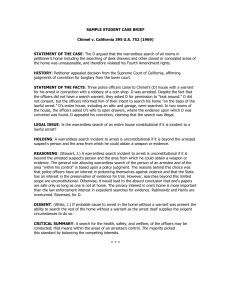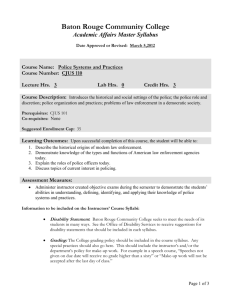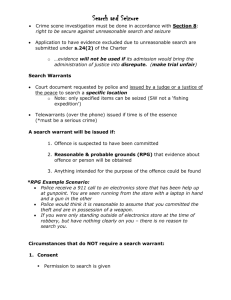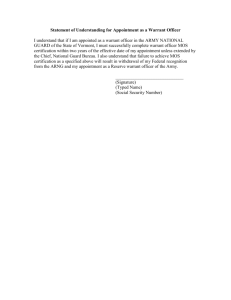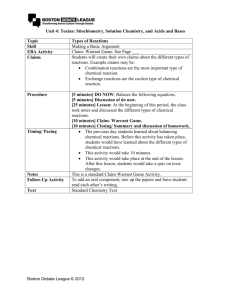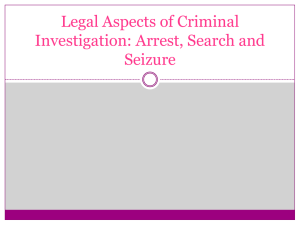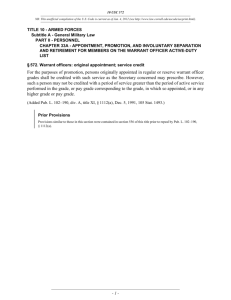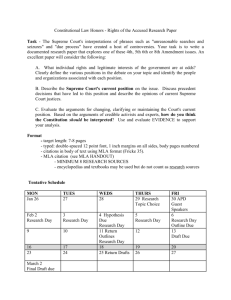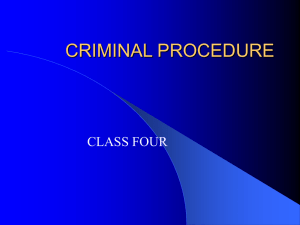Law Enforcement - Portia Placino
advertisement
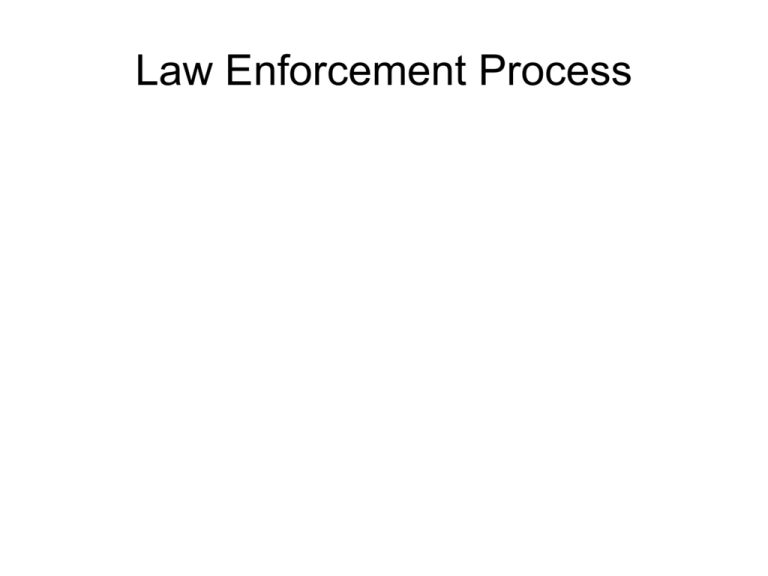
Law Enforcement Process The first contact in the Criminal Justice System would be the Law Enforcement. Law Enforcers Members of the Philippine National Police (PNP) Members of the National bureau of Investigation (NBI) Other agencies Duties of Law Enforcers Investigate the Crime Conduct surveillance Interview persons with knowledge of facts directly or indirectly connected with the offense Take photographs Arrange for entrapment Search premises and persons Examine public and other records Collect Evidence Testimony of witnesses Writings Objects Arrest Suspects By virtue of warrant of arrest Under circumstances justifying warrantless arrest (Sec. 5, Rule 113, Rules of Court) Refer the case and the suspects to the office of the public prosecutor for preliminary investigation or directly to Municipal Trial Court for trial and judgement Search and Seizure Rule 128, Rules of Court Personal properties to be searched and seized: Subject of the offense Stolen or embezzled and other proceeds or fruits of the offense used or intended Requisites for Issuance of Valid Search Warrant It must be issued upon probable cause The probable cause must be determined personally by the Judge himself, and not by the applicant or any other person In determination of probable cause, the Judge must examine in the form of searching questions and answers under oath or affirmation, the complainant and the other witnesses he may produce The search warrant must particularly describe the place to be searched and the things to be seized The search warrant must be issued in connection with one specific offense Probable Cause Facts and circumstances which would lead a reasonably discreet and prudent man to believe that an offense has been committed and that the objects sought in connection with the offense in the place sought to be searched. Search warrant must be issued in connection with one specific offense. Invalid Search Warrants SCATTER-SHOT WARRANT A search warrant for more than one offense GENERAL SEARCH WARRANT Fails to sufficiently specify the place or person to be searched or things to be searched or things to be seized. It is illegal since it contemplates random, blanket or discretionary search. It is void for a lack of particularity. Validity of Search Warrant A search warrant is valid for ten (10) days from its date. Thereafter, it shall be void. When search warrant was executed but interrupted, it may be continued on the next day, provided it is within the 10-day period of validity. Exceptions Search Incidental to Lawful Arrest Search of Moving Vehicle, Vessel or Aircraft Where the search is made pursuant to a lawful arrest, no need to obtain search warrant Since this can be quickly moved out of the locality or jurisdiction, warrantless search is justified Plain View Seizure (Plain View Doctrine) Prohibited articles may be taken without warrant if they are open to eye and hand of the peace officer who comes upon the inadvertently Custom Search Waiver Persons exercising police authority under the customs law may effect search and seizure without search warrant in the enforcement of customs law The right to be secure from unreasonable seizure may be waived and such waiver may be made either expressly or implied Stop and Frisk It is a vernacular designation of the right of a police officer to stop a citizen on the street, interrogate him, and pat him for weapons Limited protective search of outer clothing of weapon There is justifiable cause to stop and frisk the accused for hidden firearm when his companion fled upon seeing government agents Inspection Search Border Search Inspection of buildings and other premises may be made without search warrant for the enforcement of fire, sanitary and building regulations Warrantless search of incoming and outgoing passengers at the arrival and departure areas of international airports is universally allowed Consented Warrantless Search A search made by the officer after the subject of the search has consented or waived his right against unlawful search and seizure. Such waiver, if freely, willingly, knowingly and intelligently given will validate warrantless search. Exclusionary Rule This rule commands that evidence obtained by an unreasonable search and seizure is excluded from evidence. Fruit of Poisonous Tree Doctrine This doctrine means that an unlawful search taints not only the evidence obtained threat but also facts discovered by reason of said unlawful search. Silver Platter Doctrine Now an invalid doctrine, it formerly allowed evidence obtained by police officers in an illegal search and seizure to be used against the accused. Arrest (Who may effect arrest?) Police Officer (both warrantless arrest and arrest with warrant) Private Person (only warrantless arrest or citizen's arrest) Members of the Investigation Staff of NBI Bailor (for purpose of surrendering the accused to court) Provincial or City Probation Officer (may arrest probationer under his care) Who may issue warrant of arrest? Only the Judge may issue a warrant of arrest Persons Exempt from Arrest Senator or Congressman in all offenses punishable by not more than 6 years imprisonment shall be privileged from arrest while congress is in session. (Sec.11, Art VI, 1987 Constitution) Heads of State, Foreign Sovereign, Ambassadors, Public Ministers are exempt from arrest. Consuls, however, do not enjoy the same privilege. Lifetime of Warrant of Arrest It must be made 20 days from the receipt by the Warrant Section or Head of Office Warrant of Arrest remains valid and effective until it is executed (meaning accused is arrested) or quashed, lifted, set aside or recalled) The failure of a peace officer to serve warrant of arrest without sufficient justification may constitute contempt of court for obstruction of justice When is warrantless arrest lawful? When in his presence, the person to be arrested has committed an offense When in his presence, the person to be arrested is actually committing an offense When in his presence, the person to be arrested is attempting to commit an offense When an offense has in fact just been committed and he has personal knowledge of facts indicating that the person to be arrested has committed it When the person to be arrested is a prisonerescapee Warrant of Arrest may be served anywhere in the Philippines at any time of day and night.
